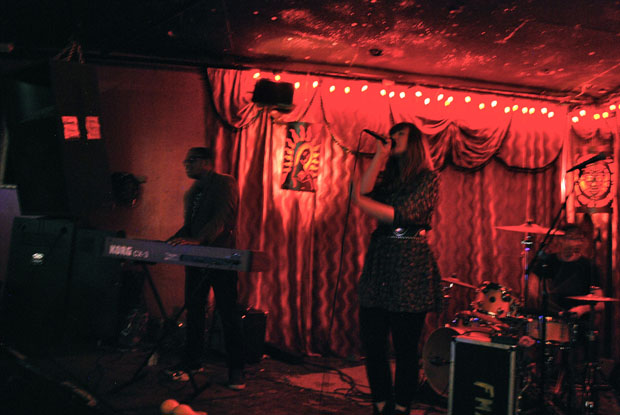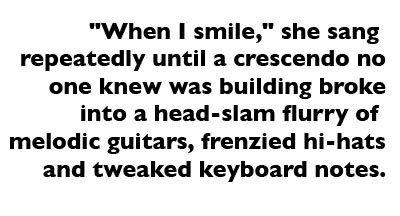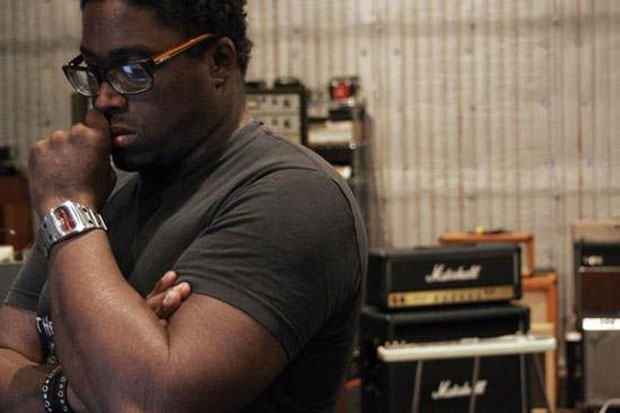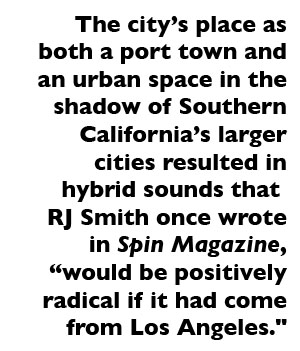Eds note: This is Part 1 of a longform nonfiction piece on Long Beach’s often-overlooked music scene that eventually became my thesis. The next two parts will run tomorrow and the next day as the lead up to a public discussion and panel I will be co-presenting on the topic–along with Cal State Long Beach’s American Studies Program Director Brett Mizelle and local musicians Dennis Owens and Marshall Goodman–as part of the EMP Pop Music Conference being held at USC on Friday, April 19. For more information on the EMP Pop Music Conference and to see L.A.’s schedule of talks, visit empmuseum.org

The Honey In the Carcass of the Lion
On a recent mild spring evening, dimly-lit Alex’s Bar—just east of Long Beach’s Cambodia Town—was alive with the Tecate-induced energy of the city’s music community in bloom.
It was a Friday night show at the punk-rock-meets-Dia-De-Los-Muertos dive bar and an interesting mix of local twenty and thirty-somethings brought the room to its 200-person capacity. The mixed crowd was not one that would commonly appear in Los Angeles just 25 miles to the north, but here in Long Beach—the most diverse large city in the nation—it’s the norm.
Black hip-hop heads in lifestyle-brand t-shirts hung with white Orange County-bred co-eds dressed on daddy’s dime who talked to second-generation Hispanic desk-jobbers who mingled with thrift-store-plaid clad hipsters of all skin shades as tough-as-nails locals in home-silkscreened hoodies made their rounds. An equally as diverse lineup was set to perform.
 One opening band played psych-tinged instrumental prog, its black female drummer channeling both Shiela E. and Zach Hill. Another sounded like 60s Brazilian tropicalia on a ride through Southern California’s pan-Latino influences. And a third performed excerpts from their latest rock opera, which was somehow right at home with the both the sequin-loving Queen fans and leather-bound Iron Maiden lovers in the audience.
One opening band played psych-tinged instrumental prog, its black female drummer channeling both Shiela E. and Zach Hill. Another sounded like 60s Brazilian tropicalia on a ride through Southern California’s pan-Latino influences. And a third performed excerpts from their latest rock opera, which was somehow right at home with the both the sequin-loving Queen fans and leather-bound Iron Maiden lovers in the audience.
None of the bands were out of place that night and none of their fans were either. Instead, conversations about mutual friends, mutual experiences and mutual hometown love crept through the silence between songs and it didn’t take long to realize that the whole bar was full of Long Beach’s music-minded faithfuls—each one separated from the other by fewer degrees than Kevin Bacon.
Not a bad turnout considering that the show’s Facebook event page only listed 90 people attending. Then again, Long Beach is a place where word of mouth is worth more than an army of Twitter followers and it’s not every day that a band from this often-overlooked city on the outskirts of Los Angeles’ endless sprawl plays a homecoming show with cross-country and European tours under its belt.
Yet, here it was, April 2011, and the Long Beach-based Free Moral Agents were back in town, surrounded by friends at Alex’s Bar after two months of shows that for the first time took the six-piece music collective from Krakow to Kansas City in support of their second album, Control This.
“It feels so good to be home and see all of you,” said Free Moral Agents’ half-Japanese vocalist Mendee Ichikawa, wearing a floral print dress and black leggings. She looked around the room, nodding lightly to all of the familiar faces in the audience while the rest of the band readied itself for the set. It was just after 1AM.
A sleepy guitar riff drifted over the crowd followed by a slow, almost tribal bongo beat that soon met Ichikawa’s voice. “When I smile,” she sang repeatedly until a crescendo no one knew was building broke into a head-slam flurry of melodic guitars, frenzied hi-hats and tweaked keyboard notes. A few minutes in, the beat changed up and dropped, as if it was now going backwards and Ichikawa’s refrain returned, this time met with a pulsing bass line and stampeding Korg chords that dragged it into the next verse.
The song—like the others on Control This—is not quite rock, not quite jazz, but not quite electronic music either. It has the ghost of King Tubby and a love of Sonic Youth, but remains funky and trance-inducing like a late 60s psych-rock 7” all while shaking hips, bobbing heads and moving feet with the excitement of a modern hip-hop track. Free Moral Agents occupy a place between all of these sonic arenas and more—an experiment in post-genre soundscapes where disparate fragments come together to form new possibilities.
But the creators of this mish mash of styles are not digital millenials, whose identities are shaped by the stylistic free-for-alls of the Internet. The members of Free Moral Agents are, however, citizens of Long Beach—a city whose industrial roots, ethnic diversity and uncharacteristic-for-Los-Angeles urban density has been fueling similarly groundbreaking cultural collisions for more than 30 years.
Taken more broadly, the band’s sound is an organic representation of Southern California’s multicultural landscape, a product not of RSS blog feeds and Spotify playlists, but a lifetime of interactions with a city that—unlike neighboring areas such as South L.A. and Orange County—has long embraced the differences of its residents.

I’ll Sleep When You’re Dead
“Long Beach is a weird place,” Long Beach keyboardist and producer Isaiah “Ikey” Owens told me one Super Bowl Sunday when he suggested we meet for mid-morning drinks at a dive bar near Downtown. “It’s a ghetto. It’s a city. It’s suburb all at once. There are just a lot of weird influences here.”
Free Moral Agents began in 2003 as Owens’ solo project and is now a collective of local musicians who blend jazz, funk, dub, hip-hop and psych rock as though it were second nature. At 36, Owens is not only the band’s instigator, but—as one of the few local musicians whose decades-long career stretches outside of Long Beach’s borders—he is also its most Google-friendly member.
From 2002 until 2011, Owens was the Grammy-winning keyboardist for The Mars Volta, a progressive rock group known for its blending of jazz, Latin-American music and math-rock time signatures. Though the band’s main members—Cedric Bixler-Zavala and Omar Rodriguez-Lopez—are originally from Texas and the band currently claims residency in El Paso, the Mars Volta formed while the two friends were living and experimenting with music in Long Beach.
Bixler-Zavala and Rodriguez-Lopez had disbanded their long-running and influential post-hardcore group, At The Drive In, and began a live dub band called De Facto. After relocating to Long Beach where some friends were from, the two recruited Owens and played with several other local musicians before morphing into The Mars Volta, a modern-day arena act that consistently sells out world tours. The city’s eclectic music community seemed to not only give the Texans a slew of new sounds to work with, but encouraged them to not be afraid of blending the ones they were already interested in playing.
“The coolest thing about here is that no bands sound alike,” Owens says of why Long Beach’s music scene is different. “You’re not going to see four bands that sound the same at a Long Beach show. That is really rare to say—across the country it’s rare.”
Owens has channeled the city’s ostensibly schizophonic landscape into a variety of projects since he began playing keyboards as a student at Long Beach’s Polytechnic High School—an institution more renown for its contributions to professional football than popular music. But in the early and mid-1990s, Lakewood-born Owens met other musicians through the school and eventually played with a number of local bands including ska kids Pocket Lent, power-pop act Teen Heroes and the Long Beach Dub All Stars—a reggae/punk fusion group that featured ex-members of Sublime.
For a while afterwards, Owens dropped his instrument altogether and followed a growing interest in electronic music and dub—the remix-heavy Jamaican-born sound that emphasizes songs’ bass tracks. He was a longtime attendee of Crucial, a still-running popular monthly dub and reggae club night at the Prospector.
After running into Bixler-Zavala and Rodriguez-Lopez at a hip-hop show in 1998, however, Owens picked up his keyboard again, joined De Facto and dove into an experimental dub phase that found him mixing the genre with rock, rap and electronics for other projects and collaborating with acts as far-apart as Hispanic rapper 2Mex, heavy metal band Mastadon and jazz-in-his-blood DJ, Flying Lotus.
 Today, in addition to playing with Free Moral Agents, Owens is also a producer-for-hire, working with everyone from San Francisco’s openly gay electro-clash group Gravy Train!!!! to Atlanta, Georgia’s instrumental psych rock band The Odist. Most recently, he was hired to play keyboards for Detroit rocker Jack White of The White Stripes on a solo world tour, adding yet another dimension to Owens’ mainstream presence.
Today, in addition to playing with Free Moral Agents, Owens is also a producer-for-hire, working with everyone from San Francisco’s openly gay electro-clash group Gravy Train!!!! to Atlanta, Georgia’s instrumental psych rock band The Odist. Most recently, he was hired to play keyboards for Detroit rocker Jack White of The White Stripes on a solo world tour, adding yet another dimension to Owens’ mainstream presence.
Owens is one of many musicians who rose up in Long Beach’s music scene during the late ‘80s and early ‘90s—a time when the city’s diverse, blue collar population was melding local punk, surf and hip-hop cultures with global music forms coming through Long Beach’s growing port complex. Rap, rock, hardcore, reggae, ska and Latin music equally flowed through the sun-splashed streets and unhindered artists discovered new possibilities at these unlikely intersections.
The city’s place as both a port town and an urban space in the shadow of Southern California’s larger cities resulted in hybrid sounds that RJ Smith wrote in Spin Magazine, “would be positively radical if it had come from Los Angeles.”
“In L.A., people are so spread out that in order to get community, they have to align themselves with a genre of music,” says Aaron Carroll, a Long Beach-born music geek who managed local independent record store Fingerprints for most of the 1990s. “Here, there are lots of different sounds and some people listen to some stuff more than others, but when it comes to genre’s, it’s always been just one big Long Beach scene.”
Though sometimes behind the scenes, Ikey Owens’ two-decade presence in popular music is emblematic of the longtime relevance of Long Beach, his longevity owing as much to his stellar musicianship as it does to the range of unique influences acquired in Long Beach.
From the early days of 3rd-wave ska to the latest folk revival and every dub and hip-hop resurgence in between, Owens has dipped his fingers in seemingly disparate genres and brought life to projects on all ends of the spectrum. Owens’ history with the diverse Long Beach scene has made him an ideal facilitator—able to connect with a myriad of bands with different backgrounds and sounds.
“I was the kind of kid who knew everyone. And I still like to hang out with all different kinds of people,” Owens says. “To me, music is all the same thing.”
Click here to continue reading Part 2…
Each part comes with its own accompanying YouTube playlist (below), feel free to listen and share!
For more information on the EMP Pop Music Conference and to see L.A.’s schedule of talks, visit empmuseum.org

